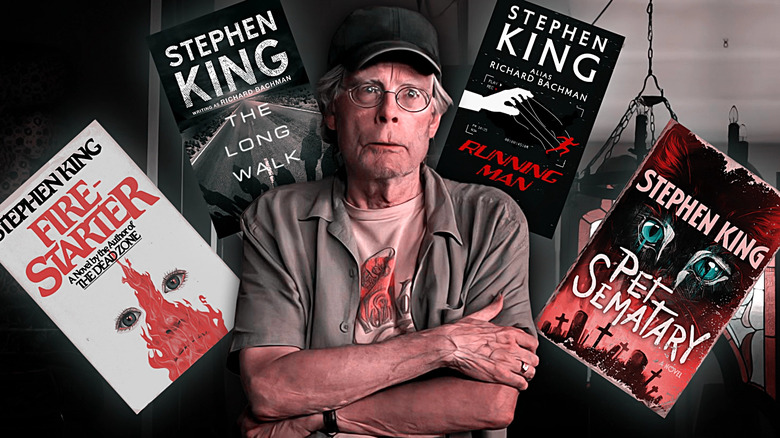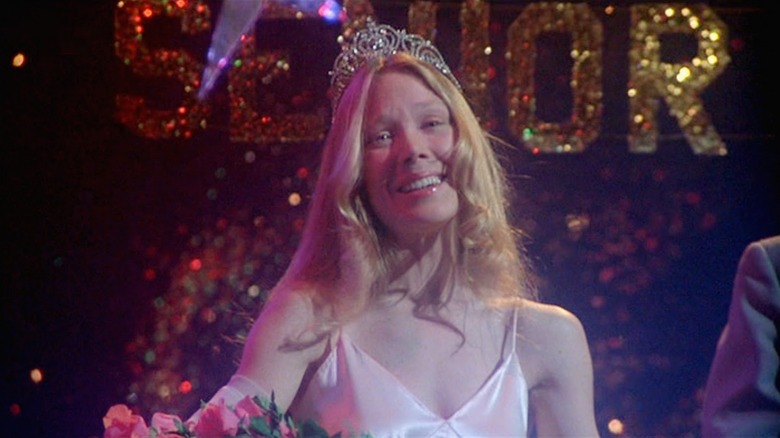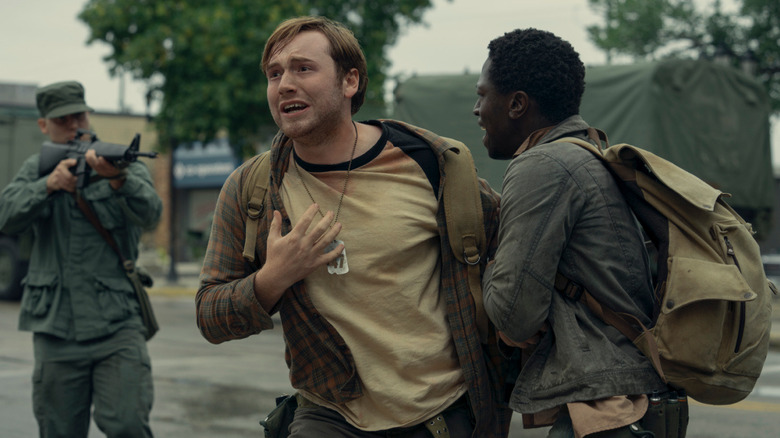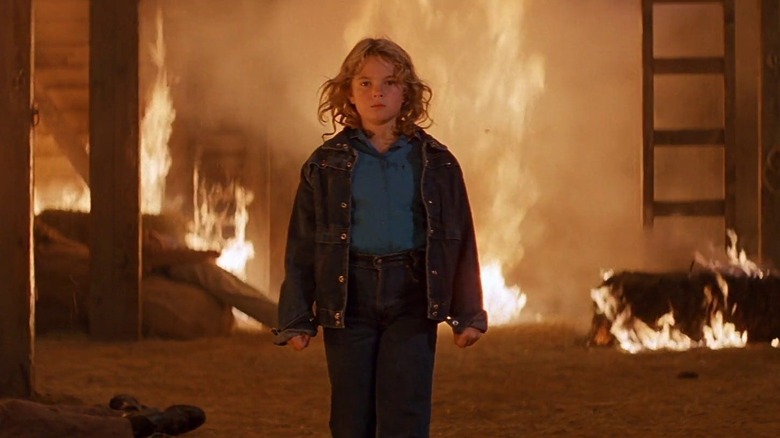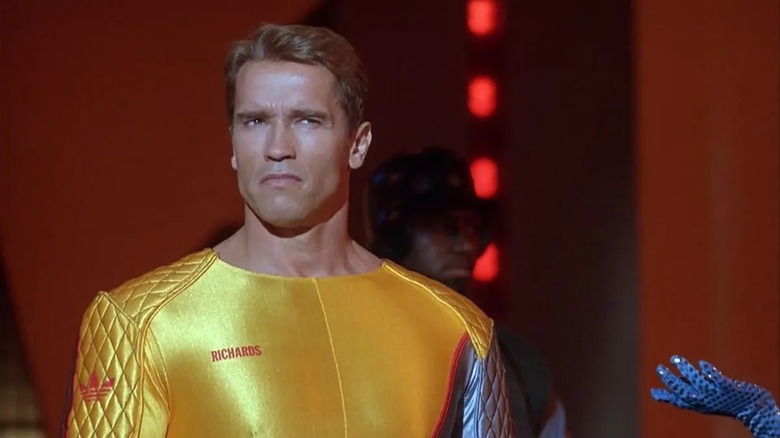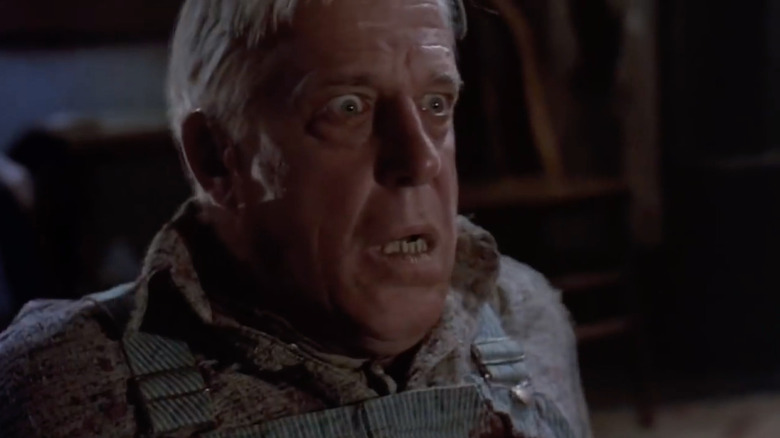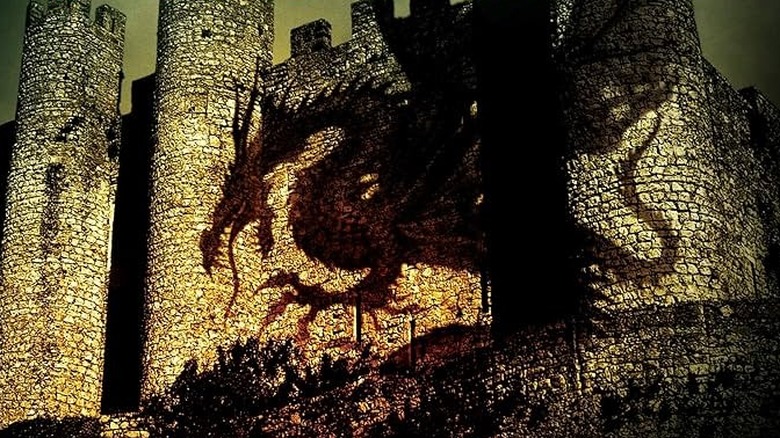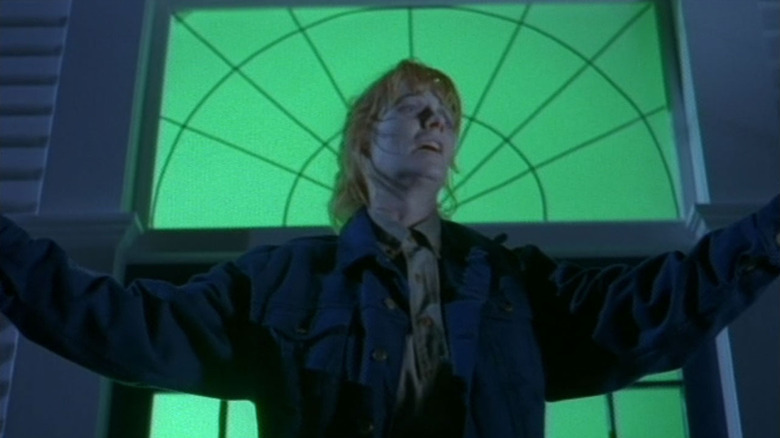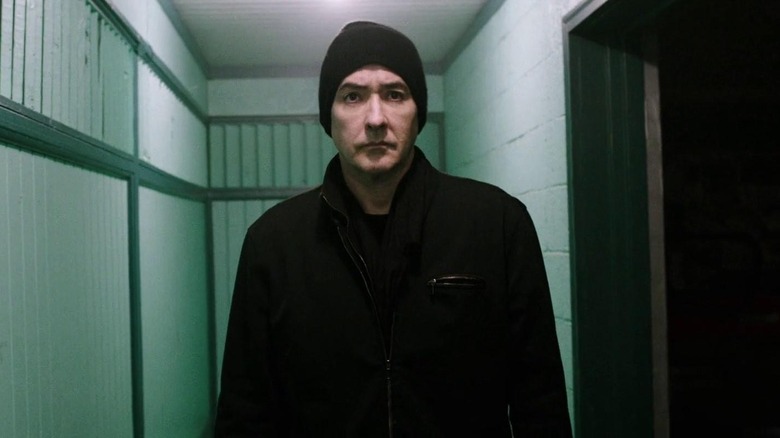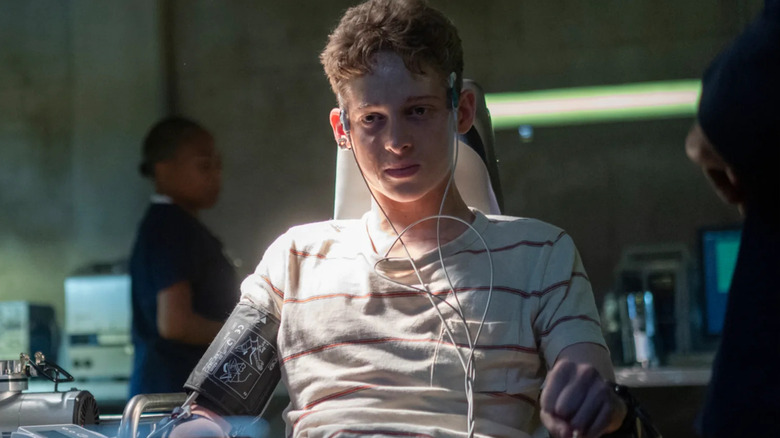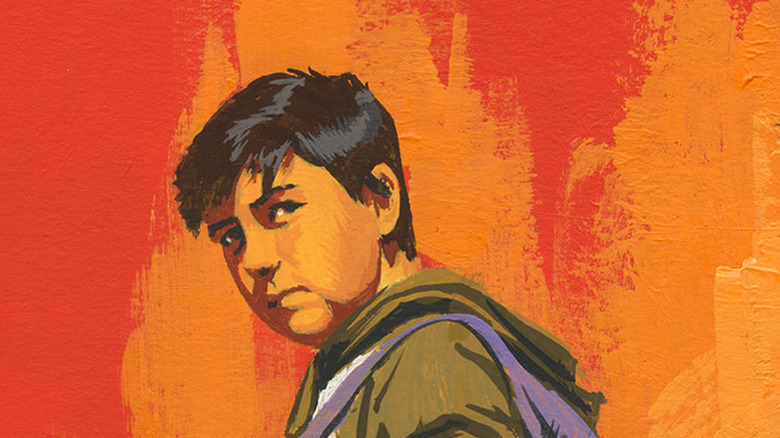10 Great Stephen King Books That Still Need Sequels
We're not exactly in a dearth of Stephen King material to engage with. The iconic, prolific horror author has written a plethora of novels and short stories that have caught the attention of and defined pop culture for over 50 years. Plus, there's a glut of film and television adaptations of his work, varying in quality from "one of the greatest films ever made" to "some of the worst." And if that ain't enough, King himself has returned to his own well plenty of times, writing long-running series like "The Dark Tower" and direct sequels like "Doctor Sleep" to "The Shining."
We've got plenty of Stephen King. But we could always use some more. So why not hypothesize about what could come next for the beloved writer? Which of his books have left some stones unturned? And what could happen in the next few pages?
Here, then, are 10 great Stephen King books that still need sequels (in my humble opinion, anyway). And be warned: there are major spoilers for every single book that will be discussed in detail to help contextualize what a sequel could look like.
Carrie
Stephen King's first published novel, "Carrie," concerns a young teenager named Carrie White who's going through puberty, dealing with vicious bullies at her school, and under the heavy thumb of an abusive, ultra-religious mother, Margaret. Throughout her trials, she discovers she has powerful telekinetic and psychic abilities, and unleashes them during a devastating prom night in revenge for a cruel prank.
The acclaimed 1976 film adaptation of the novel (seen above) received a largely forgotten sequel in 1999, titled "The Rage: Carrie 2." While that maligned film has received some reclamation since its release, it's not based on a King novel.
But King's original "Carrie" ends with a hint that there's more to explore in his themes of family lineage and trauma, not to mention the promise that others with psychic abilities exist. It would be interesting to see King return to the world of his first novel 50 years later, whether following the direct story of the telekinetic child described at the end or charting a new path.
The Long Walk
In "The Long Walk," getting a 2025 adaptation that took a long time to film, the United States has fallen under a dystopian, totalitarian stranglehold. Every year, 100 men are chosen to compete in the titular Long Walk, a deadly competition where everyone must keep, keep, keep walking or risk being shot and killed on the spot. The last man walking wins, choosing anything they desire as a reward. Hey, America may be bad, but at least we're not here! Yet!
Our main character in "The Long Walk" is Ray Garraty, a relatively kindhearted teenager who befriends many of his fellow walkers, especially Pete McVries, a more cynical competitor. By the end of the novel, Ray is the sole survivor of the horrible game, but instead of stopping and earning his prize, he chooses to keep walking forward, following the malignant but beckoning call of an ambiguous, shadowy figure.
There are a couple of ways a sequel could go. One could simply stage another Long Walk competition with a new group of youngsters — maybe women, or maybe with the drive to stop the competition once and for all. Or we could see what happens if Ray catches up with this shadowy figure. That would eliminate the ending's sense of allegory, but perhaps there's something interesting for King to say once his hero catches his demon.
Firestarter
Not unlike "Carrie," "Firestarter" concerns a young girl with potentially destructive powers — in this case, the ability to, well, start fires out of nothing. Her name is Charlie, and she's on the run with her father Andy as a shadowy government agency known as The Shop tries to capture her and use her powers for their own nefarious gains. Yes, Drew Barrymore starred in the movie, and yes, Stephen King hated it.
Also like "Carrie," the 1984 film adaptation of the book received a filmed sequel that had no basis in any of King's written works, the 2002 Sci Fi Channel miniseries "Firestarter: Rekindled" (that's a clever subtitle, I gotta admit).
But when we zoom back in on King's book, it ends with an obvious cliffhanger of global proportions. Charlie loses her father and burns a Shop building to the ground, leaving many dead. As the remaining Shop members rebuild to try and find Charlie again, she meets up with a Rolling Stone reporter to tell her unvarnished story of what happens. I would love to see King tell a "Firestarter" story with a wider scope based on this action. What happens when the fire burns for all to see?
The Running Man
After "The Long Walk," we have another dystopian novel based on a deadly competition that has a method of ambulatory transportation in its name. Stephen King has his passions (and that includes disliking some of his adaptations).
"The Running Man" paints a totalitarian, messed-up picture of the United States, a country suffering greatly that chooses to focus on keeping the rich wealthy and the poor distracted. Enter Ben Richards, a poor man in desperate need of medicine for his daughter, who decides to sign up for The Running Man, a violent game show in which hitmen chase after and try to kill any contestants looking for a cash prize.
Unlike "The Long Walk," "The Running Game" ends with a pretty definitive conclusion. Richards, his family murdered and his life at the hands of greedy network executives, commandeers an airplane and flies it directly into the Games Network headquarters, killing himself and destroying the central hub of the corrupt Running Game.
So what's the sequel? Well, Mr. King could go any direction he wanted, but my humble pitch: Tell a story from an antihero's perspective, a wannabe TV producer determined to bring back the violent games by any means necessary. "Nightcrawler" meets "Hunger Games." I don't need any money, just an acknowledgement in the foreword.
Pet Sematary
One of King's most iconic novels, "Pet Sematary" asks a universally appealing question: What if your deceased loved ones could come back to life? But it answers with a morbid revelation: Sometimes dead is better.
Dr. Louis Creed lives in Maine (duh) with his wife, kids, and pet cat. When the kitty is run over by a truck, Louis buries him in a special cemetery, under the instructions of his creepy-ass neighbor Jud. The next day, the cat comes back, somehow alive. But he's changed for the worse. Thus, a chain of tragic and violent events occurs, with Louis descending further and further into madness as he tries to play god and circumvent the pesky fact that death comes for us all.
King's novel (which he didn't like that much, weirdly) ends with a chilling image: After Louis' wife is killed by the reanimated corpse of their child (yikes!), Louis buries her immediately, hoping she will come back. As he plays solitaire in the woods, his undead wife's hand drops onto his shoulder.
So what the heck happens next? Do the Creeds start a Dr. Moreau-esque society of undead beasts? Does Louis try to maintain a normal marriage with this abomination? Or would King rather tell a different "rising from the dead" story in the same world? I think it's time for him to raise this franchise from the dead.
The Eyes of the Dragon
If I had to pick just one of King's novels to get a sequel, "The Eyes of the Dragon" is the obvious choice. I'm genuinely surprised it hasn't become a multimedia franchise by this point. Who wouldn't want "Stephen King's 'Game of Thrones'"? I can smell the TV show from here!
A pure fantasy novel, "The Eyes of the Dragon" takes place in the realm of Delain. There's a new heir to the lineage of kindhearted leaders, and the evil, magical Flagg (who does show up in other King novels, to be fair) simply will not have that. Thus begins a series of battles and quests between good and evil, order and chaos. There are, indeed, a lot of dragons.
The novel ends with Prince Peter, the rightful heir, becoming the king of Delain. His brother, Thomas, is driven to madness and jealousy by this decision and sets off to find the defeated Flagg to get revenge. These two figures meet... and the story just ends!
I can't believe how tantalizing this sequel would be. A revenge story where the brother and the villain team up to destroy a figure of pure good? It's Shakespearean! Let's see some more of that "Dragon," Stephen!
The Tommyknockers
"The Tommyknockers" is a horror-tinged science fiction novel, a work inspired by genre masters like H.P. Lovecraft and Edgar Allen Poe. It concerns the discovery of an alien spacecraft in the woods and its curious, dangerous effects on the town of Haven, Maine. People begin resorting to madness and violence. Some even transform into alien-like creatures themselves. And one little boy, David Brown, disappears under mysterious circumstances.
This all sounds good, right? Well, King himself might disagree. He wrote the novel while struggling with addiction (giving the "mysterious object that radically changes people for the worse" plot device allegorical weight), and believes that struggle ruined it.
He said, bluntly, "The Tommyknockers is an awful book. That was the last one I wrote before I cleaned up my act. And I've thought about it a lot lately and said to myself, 'There's really a good book in here, underneath all the sort of spurious energy that cocaine provides, and I ought to go back.'"
Well, Mr. King, I'd love you to go back, too, and give us another tale in the intriguing "Tommyknockers" universe with a clearer vision.
Cell
Many storytellers have warned us of the perils of technology. But King's "Cell" does it with startling clarity and cynicism, even if its movie adaptation is quantifiably the worst.
The world has been ravaged by The Pulse, a signal sent out over every single cell phone, turning every single cell phone user into a ravaging maniac, a zombie-like killer who wants to destroy whatever's in front of them. Clay Riddell, an artist from Maine (sound familiar?), teams up with a crew of survivors to try and outsmart these phone-addled killers, avoid a particularly vicious figure dubbed the Raggedy Man, and reunite with his young son.
At the end of the novel, after lots and lots of death and destruction, Clay does indeed find his son. Unfortunately, his son has fallen prey to the Pulse — but there's still some hope. See, this particular flavor of Pulse was corrupted, leaving Clay's son somewhat tethered to reality. So Clay decides, in an effort to "reset" his child, to expose him to the unfiltered version of the Pulse. He puts the phone to his son's ears, and the book ends.
Yes, a sequel could show us directly "what happens next." But I also think this dystopian world has enough nooks and crannies to tell all kinds of stories in, especially considering the massive expansion of technology since its publication 20 years ago.
The Institute
"The Institute" feels like a culmination of King's works like "Firestarter" and "It," with his powerful children in peril, shadowy government organizations, and bittersweet epilogues.
The titular Institute holds all kinds of children with special powers, from telepathy to telekinesis. But this Institute nabs these children by force, murdering their parents and running miserable experiments on them to try and procure more power. Can 12-year-old Luke Ellis team up with his fellow children to avoid their tragic fates, harness their abilities for good, and perhaps put an end to the Institute?
King's novel ends with a queasy kind of truce: A USB stick implicating the Institute in all kinds of crime is given to Luke by a threatening, lisping man. He promises the Institute will leave him alone if this data remains under lock and key. Luke takes the deal and ends the novel thinking about a sacrifice made by a fellow child with supernatural powers. Did Luke make the right decision? Or is a similar sacrifice gnawing at him?
I think it would be engrossing to find out what happens next. King could even go full "It" and set his second part many years later, with the surviving kids now adults who decide enough is enough.
Later
King has written three interesting, slightly out-of-genre books for the specialty Hard Case Crime literary label, which aims to produce works in the vein of the hardboiled pulp novels of yesteryear. Of these three, "Later" could provoke the most interesting and even poignant sequel.
"Later" follows Jamie Conklin, a young boy who lives with his single mother, Tia, and discovers he can communicate with ghosts. The various adults in his life use his powers to various ends, including attempts to solve crimes for a disgruntled NYPD detective (who's also Tia's ex). And Jamie discovers some harrowing secrets about his own family spirits.
The book ends with Jamie talking to the ghost of his dead uncle, Harry, who tells him that, in actuality, he's Jamie's father. Beyond the icky, incestuous ramifications of this spiritual confession, Jamie now becomes concerned that he'll develop Alzheimer's and die of the disease, just like his uncle/father. But when offered a test to see the likelihood, Jamie simply responds, "Later."
I am so intrigued by the idea of a medium, many years after developing his powers, realizing he might be struggling with memory and reality. How would that affect Jamie's connections to the spirit world? Could he trust anything, and could anyone trust him? I think it could make for a fascinating, tragic read. My title pitch: "Now."
